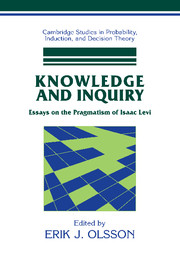Book contents
- Frontmatter
- Contents
- List of Contributors
- Preface
- Introduction: The Pragmatism of Isaac Levi
- 1 Isaac Levi and His Pragmatist Lineage
- 2 Is Pragmatist Truth Irrelevant to Inquiry?
- 3 The Knowledge Business
- 4 Infallibility and Incorrigibility
- 5 Why Inconsistency Is Not Hell: Making Room for Inconsistency in Science
- 6 Levi on Risk
- 7 Vexed Convexity
- 8 Levi's Chances
- 9 Isaac Levi's Potentially Surprising Epistemological Picture
- 10 Isaac Levi on Abduction
- 11 Potential Answers – To What Question?
- 12 Levi and the Lottery
- 13 The Value of Truth and the Value of Information: On Isaac Levi's Epistemology
- 14 Decision-Theoretic Contraction and Sequential Change
- 15 Deciding What You Know
- 16 Levi's Ideals
- 17 The Mind We do Not Change
- 18 Psychoanalysis as Technology
- 19 Levi on Money Pumps and Diachronic Dutch Books
- 20 Levi on the Reality of Dispositions
- 21 Replies
- Index
4 - Infallibility and Incorrigibility
Published online by Cambridge University Press: 05 March 2010
- Frontmatter
- Contents
- List of Contributors
- Preface
- Introduction: The Pragmatism of Isaac Levi
- 1 Isaac Levi and His Pragmatist Lineage
- 2 Is Pragmatist Truth Irrelevant to Inquiry?
- 3 The Knowledge Business
- 4 Infallibility and Incorrigibility
- 5 Why Inconsistency Is Not Hell: Making Room for Inconsistency in Science
- 6 Levi on Risk
- 7 Vexed Convexity
- 8 Levi's Chances
- 9 Isaac Levi's Potentially Surprising Epistemological Picture
- 10 Isaac Levi on Abduction
- 11 Potential Answers – To What Question?
- 12 Levi and the Lottery
- 13 The Value of Truth and the Value of Information: On Isaac Levi's Epistemology
- 14 Decision-Theoretic Contraction and Sequential Change
- 15 Deciding What You Know
- 16 Levi's Ideals
- 17 The Mind We do Not Change
- 18 Psychoanalysis as Technology
- 19 Levi on Money Pumps and Diachronic Dutch Books
- 20 Levi on the Reality of Dispositions
- 21 Replies
- Index
Summary
In his book The Enterprise of Knowledge, Isaac Levi makes a distinction between infallibility and incorrigibility and remarks that many authors, among them Peirce, do not seem to be aware of the difference. Levi's distinction is made in the context of his discussion of fully justified belief, or “knowledge as a standard for serious possibility.”
To be (epistemologically) infallible about a piece of knowledge is to ascribe maximum certainty to it, in the sense that anything inconsistent with it will not be regarded as a serious possibility. According to Levi, we are entitled to claim infallibilism for a certain corpus of knowledge that extends beyond logical, analytical, mathematical, and other a priori truths.
To claim incorrigibility for a piece of knowledge is to claim that we will never change our mind about it, that it will still belong to our corpus of knowledge no matter what new evidence will come across. It is permanent, rather than maximum certainty.
Levi's standpoint is that although we are entitled to disregard certain possibilities as not being serious (and hence to claim epistemological infallibility about their negations), we must still allow the possibility that we will change our mind in the future, that is, we must not claim incorrigibility.
In the latter respect, he agrees with common morality, which, at least in scientific contexts, is to be prudent about one's conclusions and to admit the possibility of being mistaken and therefore to admit corrigibility about anything that is not a priori.
- Type
- Chapter
- Information
- Knowledge and InquiryEssays on the Pragmatism of Isaac Levi, pp. 65 - 69Publisher: Cambridge University PressPrint publication year: 2006
- 1
- Cited by

